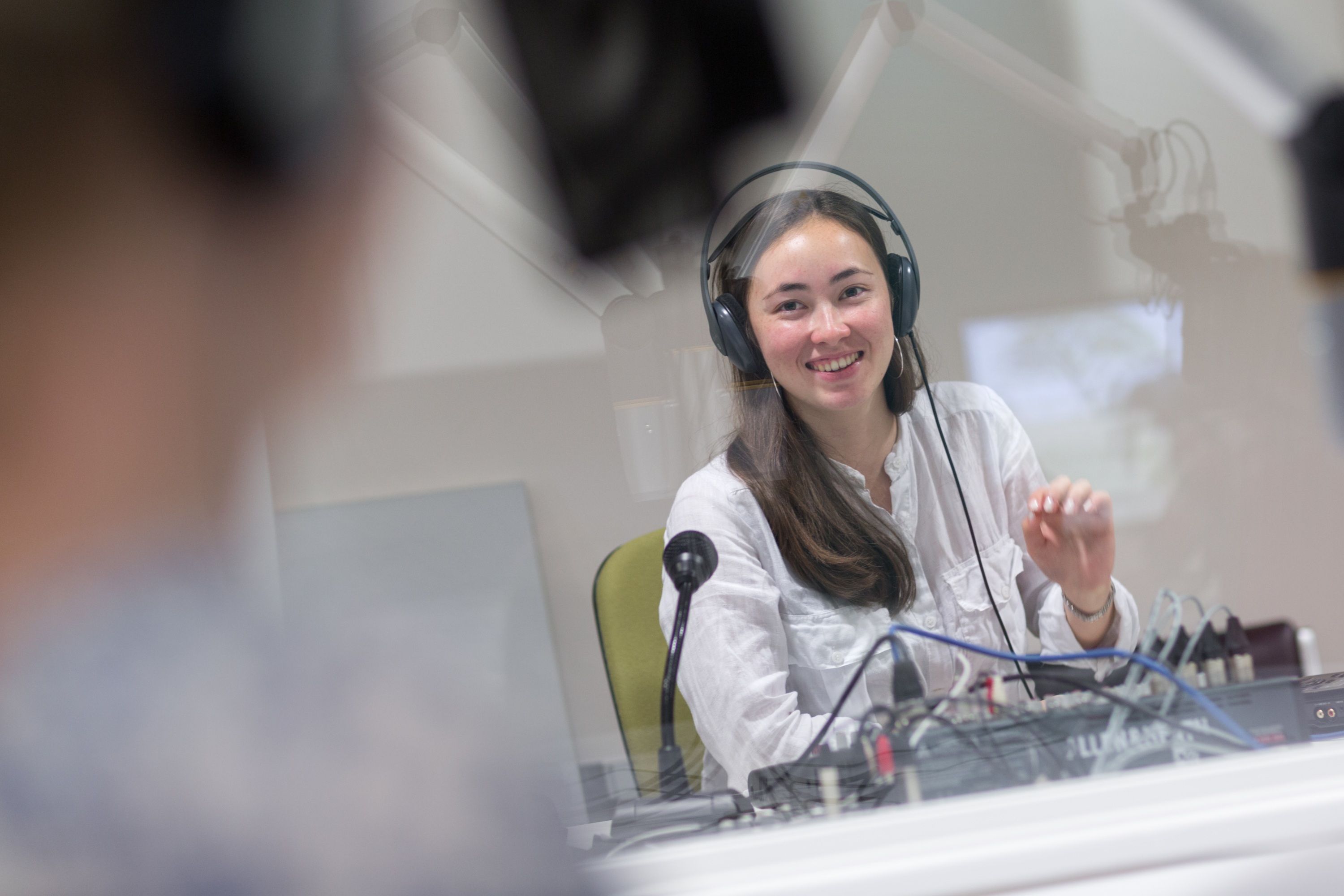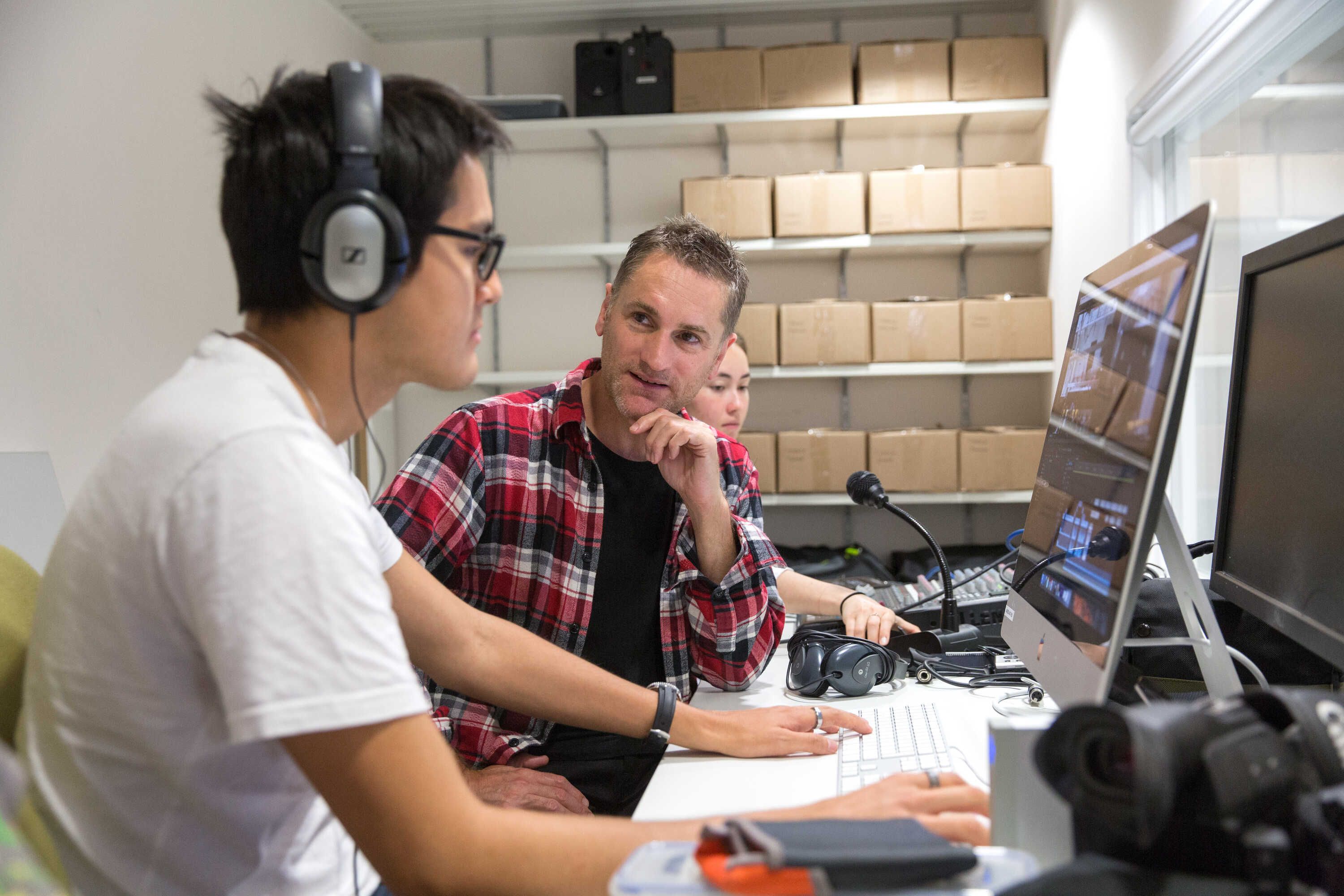
Science Communication
Prepare for a range of science communication careers through academic and practical experience.
Prepare for a range of science communication careers through academic and practical experience – from journalism to policy
Develop your technical skills in our in-house TV and radio facilities
Gain industry insights on a work placement with a media company or science communication organisation
Course key facts
-
Qualification
-
MSc
-
-
Duration
1 year, 2 years
-
Start date
September 2025
-
Study mode
Full-time, Part-time
-
Fees
£13,100 Home
£29,700 Overseas
-
Delivered by
-
Location
-
South Kensington
-
Course overview
Develop an informed, critical and creative approach to communicating science to professional media standards on this Master's course.
You'll study a combination of academic and practical modules in order to prepare you for a range of careers in science communication.
This course will further your critical understanding of communicating scientific ideas to the public.
You'll also advance your technical and conceptual skills by working in a range of media, and gain direct industry experience on a work placement or internship.
A significant component of the course will be an academic dissertation, where you'll apply your knowledge from the course to an element of investigative work.
If you wish to focus solely on broadcast media and filmmaking, we also offer an MSc in Science Media Production.
Online open day
Our online open day will be held from 15.00-17.00 UK time on Wednesday 11 December 2024. For details and to sign up, please contact liam.watson@imperial.ac.uk.
Structure
This page is updated regularly to reflect the latest version of the curriculum. However, this information is subject to change.
Find out more about potential course changes.
Please note: it may not always be possible to take specific combinations of modules due to timetabling conflicts. For confirmation, please check with the relevant department.
You’ll take all core modules.
Core modules
Explore the contemporary debates surrounding science and its place in the world, and consider how scientific expertise in the public domain becomes controversial and contested.
Assess how media texts are constructed in the coverage of science and the journalistic norms and practices that lead to this coverage.
In addition to an introduction to core skills and a term-long creative project, you will choose two strands in this module, which may include: Digital Media Campaigning; Exhibitions; Radio; Television; and Writing for Journalism. In each strand, you will work on practical projects that replicate professional output in that medium.
You’ll choose three optional academic modules. Please note, exact modules may vary from year to year.
Optional modules
Engage with seminal works in the history of documentary film and develop a critical eye to recent developments in factual TV.
Explore issues surrounding the construction of meaning in visual and spatial media and examine the problems of presenting complex and controversial science in museums.
Examine key concepts from narrative theory to inform your narrative writing and consider important theoretical issues from a range of genres and media.
This module looks at the role of fiction in science communication, and the ways science and fiction have shaped each other over the centuries, covering literature, film, theatre, and games.
Critically examine perspectives on international development and the issues these raise for science communication.
Analyse the relationship between communication, science and policymaking and discover how public policy is determined.
Consider influential works of radio documentary and drama to examine how audio media create visual images in listeners’ minds and the implications this has for the truth-telling power of the medium.
You'll carry out an attachment or internship with a science communication organisation, typically lasting three or four weeks.
This will enable you to gain experience of the real world of science communication and put in practice the knowledge gained on the course.
You’ll benefit from the supervision and guidance of professional science communicators and widen your range of contacts both in the media industry and in the world of science communication.
You’ll undertake a substantial piece of academic research that engages critically with the relevant scholarly literature and involves some element of investigative work.
The research must be written up in the form of a 10,000-word dissertation.
Teaching and assessment
Teaching and learning methods
-
Lectures
-
Supervised workshops
-
Seminars
-
Online reading
-
Virtual learning environment
-
Supervised projects
-
Supervised work placements
Assessment methods
-
Essays
-
Practical coursework projects and group projects
-
Dissertation
Entry requirements
We consider all applicants on an individual basis, welcoming students from all over the world.
How to apply
Apply online
You can submit one application form per year of entry. You can choose up to two courses.
There is no application fee for MRes courses, Postgraduate Certificates, Postgraduate Diplomas, or courses such as PhDs and EngDs.
If you are applying for a taught Master’s course, you will need to pay an application fee before submitting your application.
The fee applies per application and not per course.
- £80 for all taught Master's applications, excluding those to the Imperial College Business School.
- £100 for all MSc applications to the Imperial College Business School.
- £150 for all MBA applications to the Imperial College Business School.
If you are facing financial hardship and are unable to pay the application fee, we encourage you to apply for our application fee waiver.
The application deadline for 2025 entry is 23.59 on Thursday 27 February 2025.
If you have any questions, please contact the SCU Administrator liam.watson@imperial.ac.uk.
When you apply online, you must complete an aptitude assignment for your chosen course.
This should be attached along with your personal statement, under the 'personal statement' section of the online application form.
Visit this page to access the compulsory aptitude assignment.
Find out more about how to apply for a Master course , including references and personal statements and the aptitude assignment.
After you apply you may be invited for an interview with members of our staff.
We interview all shortlisted applicants, these interviews will be held online.
An ATAS certificate is not required for students applying for this course.
Tuition fees
Home fee
Full-time
£13,100
Part-time
£6,550per year
You should expect and budget for your fees to increase each year.
Your fee is based on the year you enter the university, not your year of study. This means that if you repeat a year or resume your studies after an interruption, your fees will only increase by the amount linked to inflation.
Find out more about our tuition fees payment terms, including how inflationary increases are applied to your tuition fees in subsequent years of study.
Whether you pay the Home or Overseas fee depends on your fee status. This is assessed based on UK Government legislation and includes things like where you live and your nationality or residency status. Find out how we assess your fee status.
If you're a UK national, or EU national with settled or pre-settled status under the EU Settlement Scheme, you may be able to apply for a Postgraduate Master’s Loan from the UK government, if you meet certain criteria.
For courses starting on or after 1 August 2024, the maximum amount is £12,471.
The loan is not means-tested and you can choose whether to put it towards your tuition fees or living costs.
Overseas fee
Full-time
£29,700
Part-time
£14,850per year
You should expect and budget for your fees to increase each year.
Your fee is based on the year you enter the university, not your year of study. This means that if you repeat a year or resume your studies after an interruption, your fees will only increase by the amount linked to inflation.
Find out more about our tuition fees payment terms, including how inflationary increases are applied to your tuition fees in subsequent years of study.
Whether you pay the Home or Overseas fee depends on your fee status. This is assessed based on UK Government legislation and includes things like where you live and your nationality or residency status. Find out how we assess your fee status.
If you're a UK national, or EU national with settled or pre-settled status under the EU Settlement Scheme, you may be able to apply for a Postgraduate Master’s Loan from the UK government, if you meet certain criteria.
For courses starting on or after 1 August 2024, the maximum amount is £12,471.
The loan is not means-tested and you can choose whether to put it towards your tuition fees or living costs.
How will studying at Imperial help my career?
Develop the skills needed to pursue a diverse range of careers in science communication.
During your time with the Science Communication Unit, you'll work alongside industry leaders and network with science communication experts
With specialised knowledge, you'll be highly sought after in a range of sectors.
Graduates are prepared for careers in journalism, public engagement, and press relations.
Other potential career paths include science policy, broadcasting, digital campaigning, museums and academia.
Further links
Contact the department
- Telephone: +44 (0) 20 7594 8753
- Email: liam.watson@imperial.ac.uk
Visit the Science Communication Unit website.

Request info
Find out more about studying at Imperial. Receive updates about life in our community, including event invites and download our latest Study guide.

Events, tasters and talks
Meet us and find out more about studying at Imperial.

Terms and conditions
There are some important pieces of information you should be aware of when applying to Imperial. These include key information about your tuition fees, funding, visas, accommodation and more.
You can find further information about your course, including degree classifications, regulations, progression and awards in the programme specification for your course.
Programme specifications